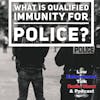Qualified Immunity for Police Officers?
Let's take a deep dive into a topic that is hot, especially on Social Media. Qualified Immunity for Police Officers. What is Qualified Immunity for Police Officers? What does it cover, what does it not cover? Is there such a thing as total immunity, and who gets that.
First, many of the loudest critics of Qualified Immunity, especially those that constantly spout to end all qualified immunity for police officers, don't understand what it is.
What is qualified immunity for police?
Qualified immunity is a legal doctrine in the United States that shields government officials, including police officers, from being held personally liable for actions taken within the scope of their official duties, as long as those actions do not violate "clearly established" constitutional or statutory rights of the person affected. This doctrine was established by the U.S. Supreme Court in a series of cases, with the rationale that it's important to allow government officials to perform their duties without the fear of facing personal lawsuits and financial liability for every decision they make on the job.
In the context of law enforcement, qualified immunity means that a police officer can generally avoid being held personally responsible for civil rights violations, such as excessive use of force or unlawful searches and seizures, unless the specific actions they took are found to have violated clearly established constitutional rights as determined by prior court decisions. This "clearly established" standard means that the rights violated must have been so well-established that a reasonable officer would have known their actions were unlawful in that situation. Qualified Immunity for Police Officers.
Critics of qualified immunity argue that it can shield officers from accountability even in cases of egregious misconduct, as establishing a violation of "clearly established" rights can be a high legal bar. This has led to calls for reform and changes to the doctrine to make it easier for individuals to seek justice when their rights are violated by government officials, including police officers. As of my last knowledge update in September 2021, there have been ongoing discussions and legislative efforts at both the state and federal levels to reform or eliminate qualified immunity to address these concerns. However, the specific status and developments since then are beyond my current knowledge.
What is evidence of clearly established violation of rights by police? Qualified Immunity for Police?
A "clearly established" violation of rights by police refers to a situation where the specific actions taken by law enforcement officers are in direct contradiction to existing legal precedent, court decisions, or statutes that clearly outline the rights of individuals in similar circumstances. In order to overcome qualified immunity and hold officers personally liable for their actions, plaintiffs must demonstrate that not only were their rights violated, but also that those rights were so clearly defined in previous court cases that any reasonable officer would have been aware that their actions were unlawful.
Here are the general steps involved in establishing a "clearly established" violation of rights by police:
Identify the Right: The plaintiff needs to establish the constitutional or statutory right that was allegedly violated. This could include rights such as the Fourth Amendment protection against unreasonable searches and seizures, the Eighth Amendment protection against cruel and unusual punishment, or other rights guaranteed by the U.S. Constitution or relevant laws.
Show Prior Precedent: The plaintiff must demonstrate that there is a previous court decision that is sufficiently similar to the current case and that clearly established the right being violated. This prior case law serves as the foundation for arguing that a reasonable officer should have known that their actions were unconstitutional.
Analogous Cases: The plaintiff must show that the facts and circumstances of the prior court case are closely analogous to the current case. This means that the legal principles and facts of the previous case are similar enough that a reasonable officer in the current case should have been aware of the established rights.
Official's Knowledge: The plaintiff needs to establish that the officer or officers involved in the current case had actual or constructive knowledge of the prior precedent that clearly established the right being violated. This can be challenging to prove, as it requires showing that the officers should reasonably have known about the existing case law.
No Reasonable Dispute: It's important to demonstrate that there was no reasonable dispute among legal experts about the established right being violated. This helps to reinforce the argument that the violation was indeed "clearly established."
It's worth noting that the process of determining whether a right was "clearly established" is often subject to legal interpretation, and courts may differ in their assessments. The Supreme Court has provided guidance on qualified immunity over the years, but there is still ongoing debate and discussion about how this doctrine should be applied in practice. Keep in mind that legal standards and interpretations can evolve over time, so it's advisable to consult legal experts or recent legal opinions for the most up-to-date information.
What is the opposite of qualified immunity? Qualified Immunity for Police?
The opposite of qualified immunity would be strict liability or absolute liability. These are legal concepts that hold individuals or entities liable for certain actions regardless of their intent or level of care. Unlike qualified immunity, which provides a degree of protection to government officials like police officers, strict or absolute liability removes or significantly reduces the requirement to prove intent, negligence, or fault in certain cases.
Strict liability and absolute liability are most commonly applied in cases involving product liability, environmental damage, and hazardous activities. In these contexts, if harm or damage occurs, the responsible party can be held liable even if they took all reasonable precautions and had no intention of causing harm.
It's important to note that qualified immunity is a specific legal doctrine related to government officials' liability for civil rights violations, particularly in the context of law enforcement. Strict liability and absolute liability, on the other hand, are broader concepts that can apply to various areas of law beyond civil rights.
"Total immunity" is not a widely recognized legal term or doctrine like "qualified immunity." In legal discussions, the term "total immunity" might be used colloquially to refer to a situation where an individual or entity is completely shielded from any form of liability or legal consequences. However, this term is not a standard legal concept and does not have a well-defined meaning within the legal framework.
In the context of government officials, including police officers, "qualified immunity" is the more commonly discussed concept. As explained earlier, qualified immunity provides a level of protection from personal liability for government officials when they are acting within the scope of their official duties and as long as they do not violate clearly established constitutional or statutory rights.
What are the types of Immunity? Qualified Immunity for Police?
There are several types of immunity that can apply to government officials in various legal contexts. These immunities provide varying degrees of protection from legal liability based on the nature of the official's role and the circumstances of their actions. Here are a few types of immunity that government officials might encounter:
Qualified Immunity: As previously discussed, qualified immunity is a doctrine that protects government officials, including police officers, from personal liability for civil rights violations as long as their actions did not violate clearly established constitutional or statutory rights.
Sovereign Immunity: Sovereign immunity is a legal doctrine that protects governments and their agencies from being sued without their consent. It originated from the principle that the government cannot be sued without its own permission. This doctrine varies in scope and application depending on the jurisdiction and the specific context of the case.
Legislative Immunity: Legislative immunity, also known as parliamentary immunity or legislative privilege, protects elected officials, such as members of Congress or other legislative bodies, from legal action related to their legislative activities. This immunity ensures that lawmakers can freely express their opinions, participate in debates, and make decisions without the fear of legal reprisal.
Executive Immunity: Executive immunity, also referred to as executive privilege or official immunity, provides certain protections to government officials in the executive branch, including the president or other high-ranking officials. It can involve the ability to withhold certain information from public disclosure or legal proceedings in the interest of national security or executive confidentiality.
Diplomatic Immunity: Diplomatic immunity is a principle that grants certain legal protections to diplomats and foreign government officials while they are in a host country. This immunity prevents them from being subject to the jurisdiction of the host country's courts and laws.
Judicial Immunity: Judicial immunity protects judges and court officials from legal action related to their judicial duties. This immunity is designed to ensure that judges can make impartial decisions without fear of personal liability.
Absolute Immunity: Absolute immunity is a more extensive form of immunity that offers complete protection from liability for certain actions. It's often applied in specific situations where there's a compelling need to shield officials from legal action, such as when judges make decisions within their jurisdiction or prosecutors engage in certain prosecutorial functions.
It's important to note that the extent and application of these immunities can vary based on the jurisdiction, the nature of the actions, and the specific laws in place. Additionally, these immunities are subject to interpretation and potential limitations, and legal cases may challenge their boundaries in various situations.
So, who gets Legislative Immunity? Qualified Immunity for Police?
Legislative immunity, also known as parliamentary immunity or legislative privilege, is a legal protection granted to elected officials who serve in legislative bodies. This immunity is designed to ensure that lawmakers can perform their legislative duties without the fear of legal reprisal or harassment, thereby promoting free and open debate and discussion. The specific individuals who receive legislative immunity include:
Members of Congress: In the United States, members of the U.S. Congress (both the House of Representatives and the Senate) are granted legislative immunity. This immunity applies to their official legislative activities, such as speeches, debates, and votes. It allows them to express their opinions freely without being subject to lawsuits for defamation or other legal actions related to their statements or actions as legislators.
Members of State Legislatures: Similarly, members of state legislatures in the U.S. are often granted legislative immunity for their activities within the legislative process.
Members of Other Legislative Bodies: Legislative immunity can also apply to members of other legislative bodies at various levels of government around the world. This might include local city councils, regional assemblies, and national parliaments in different countries.
It's important to note that legislative immunity typically applies to actions taken within the scope of a legislator's official duties. It does not generally protect lawmakers from legal consequences for actions outside their legislative role, such as criminal activities or personal actions unrelated to their duties as legislators. The extent and limitations of legislative immunity can vary from jurisdiction to jurisdiction, and specific laws or regulations define the scope of this protection.
Who gets Sovereign Immunity? Qualified Immunity for Police?
Sovereign immunity is a legal doctrine that grants a level of immunity to governments and government entities from being sued without their consent. The concept is rooted in the idea that a sovereign state or government should not be subject to the jurisdiction of its own courts unless it consents to be sued. The application of sovereign immunity varies depending on the jurisdiction and the nature of the case. Here are some entities and situations that often receive sovereign immunity:
Federal Government: In the United States, the federal government generally benefits from sovereign immunity, which means that it cannot be sued without its consent. However, the federal government has waived its immunity in certain situations through legislation like the Federal Tort Claims Act (FTCA), which allows individuals to sue the government for certain torts committed by federal employees within the scope of their employment.
State Governments: Similarly, state governments in the U.S. have sovereign immunity from lawsuits unless they have waived this immunity in specific cases or areas through legislation. Many states have laws that allow individuals to sue the state under certain circumstances, but these waivers are often limited.
Local Governments: Local government entities, such as cities, counties, and municipalities, might also enjoy varying levels of sovereign immunity. Laws and regulations can vary from state to state, and some local governments may have specific provisions that limit their liability or grant immunity in certain situations.
Foreign Governments: Sovereign immunity also applies to foreign governments in international law. Generally, foreign governments cannot be sued in the courts of another country without their consent. However, international treaties, conventions, and customary international law can affect the extent of this immunity.
Government Agencies: Different government agencies or departments might also be covered by sovereign immunity, depending on the jurisdiction and specific laws.
It's important to note that sovereign immunity does not mean that governments and government entities are completely immune from legal action. Many jurisdictions have exceptions or limitations to sovereign immunity, allowing individuals to bring lawsuits against the government under certain circumstances. Additionally, some governments may establish special administrative processes or compensation funds to address claims against them without going through traditional court litigation. The specifics of sovereign immunity and its exceptions can vary widely depending on the country and its legal framework.
Who gets Executive Immunity? Qualified Immunity for Police?
"Executive immunity" is a term that is sometimes used to refer to the concept of executive privilege or official immunity, which provides certain protections to government officials in the executive branch of government. However, it's important to note that the term "executive immunity" isn't a standard legal term, and the specific protections it refers to can vary based on the jurisdiction and context. Here are a couple of related concepts that might be associated with "executive immunity":
Executive Privilege: Executive privilege is the principle that allows the executive branch of government (including the president and other high-ranking officials) to withhold certain information from public disclosure or legal proceedings, typically on the grounds of national security, the need for confidential deliberations, or the effective functioning of the executive branch. It's a form of protection that allows officials to maintain confidentiality in certain matters.
Official Immunity: This term can be used to describe the protection that government officials receive from legal actions related to their official duties. It's often more broadly applied to officials in various branches of government, including the executive branch. Official immunity can take various forms and might involve protecting officials from personal liability for certain actions taken within the scope of their duties.
It's worth noting that the specifics of executive privilege and official immunity can vary significantly depending on the jurisdiction and the legal framework in place. In the United States, for example, executive privilege is a constitutional principle that has been upheld by the courts, but its scope and limitations have been subject to legal interpretation and disputes over time. Additionally, official immunity can vary based on the level of government, the nature of the official's role, and the legal standards that apply.
As the term Judicial Immunity implies, it protects judges and court officials from legal action related to their judicial duties.
And last, but not least, who gets Absolute Immunity? Qualified Immunity for Police?
"Absolute immunity" is a legal concept that provides individuals with complete protection from liability for certain actions, regardless of whether those actions were taken with good intentions or in the course of official duties. This level of immunity is quite rare and is typically reserved for specific roles or functions where there's a compelling need to shield individuals from legal action. Here are a few contexts in which absolute immunity might be applied:
Judicial Immunity: Judges are often granted absolute immunity for actions taken within their judicial capacity. This immunity is designed to ensure that judges can make impartial decisions without the fear of being personally sued for their judgments, even if those judgments are later found to be incorrect or unfair. However, this immunity generally doesn't apply to actions taken outside the scope of their judicial duties.
Prosecutorial Immunity: Prosecutors might be granted absolute immunity for certain actions taken in the course of their prosecutorial duties, such as initiating and pursuing criminal cases. This immunity is meant to encourage prosecutors to carry out their responsibilities without the constant fear of being personally sued by those they prosecute.
Certain Legislative Functions: In some cases, legislators might be granted absolute immunity for activities directly related to their legislative functions, such as the content of speeches and debates on the legislative floor. This immunity ensures that legislators can express their opinions and advocate for policies without fear of legal repercussions.
Certain High-Ranking Officials: Some high-ranking government officials might be granted a form of absolute immunity for actions taken within the scope of their official duties. This is often based on the idea that these officials need to make critical decisions without fear of personal liability, even if those decisions are controversial.
It's important to note that even in cases of absolute immunity, there can be exceptions or limitations. For example, if an official's actions are deemed to be outside the scope of their duties or involve clear misconduct, the immunity might not apply. The specific scope and application of absolute immunity can vary based on jurisdiction, laws, and legal precedents.
Absolute Immunity does not apply to police. But it does apply to most everyone else in the Judicial system.
What most people that call for the end of qualified immunity for police do not understand, is the concept of qualified immunity, what it covers, what it does not and most importantly the legal ramifications of ending qualified immunity. So, if qualified immunity is ended for all police, then every officer can be held civilly liable for trial, for documents that were prepared by the Judicial, Legislative and Executive Branches of the Government, that have almost total immunity for their actions. Qualified Immunity for Police?




















